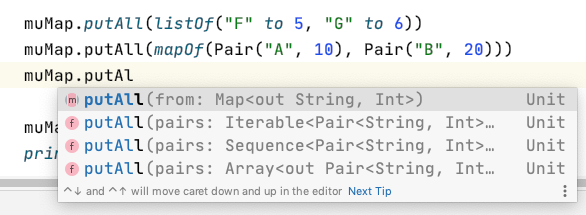[Day 22] Map & leetcode 相關練習
今天又要回來繼續講 Collections 的部分啦
Map
Map 一樣分成
- 只可讀的 Map
- 可以修改的 Mutable Map
跟 List, Set 用途不同, Map 特性如下
- Map 是使用 key, value 來儲存資料的一種資料結構,在其他語言中有時候也被稱為 dictionary (字典),因為 map 原理就是像查字典一樣,利用關鍵字(key),找到相對應的資料解釋。
- Map 的存取主要就是透過 key。
唯讀的 Map
只能讀取,不能修改內容,Kotlin 的 Map 底層是 Java 的 LinkedHashMap,資料是按照加入順序進行排列的有序集合
mapOf()
創造方式如下,使用 mapOf()
第一種方式是 mapOf(key to value,...)
第二種方式是使用 mapOf(Pair(key, value),...)
// to 省略小數點和括號的寫法
val map = mapOf("A" to 10, "B" to 20, "C" to 30) // {A=10, B=20, C=30}
val mapP = mapOf(Pair("A", 10), Pair("B", 20), Pair("C", 30)) // {A=10, B=20, C=30}
其中 to 這樣的寫法是 Kotlin 中一個叫做 infix 的 function 表示法,之後會再提到
可以修改的 Mutable Map
mutableMapOf()
mutableMapOf("A" to 10, "B" to 20, "C" to 30)
讀取 map
可以使用索引取得 [key] 或是用 get(key) 取得
println(muMap["A"])
println(muMap.get("A"))
getValue() - key 不存在時會拋出 NoSuchElementException
println(muMap.getValue("D"))
getValue(key) 取不到時會拋出異常
Exception in thread "main" java.util.NoSuchElementException: Key D is missing in the map.
at kotlin.collections.MapsKt__MapWithDefaultKt.getOrImplicitDefaultNullable(MapWithDefault.kt:24)
getOrElse(), getOrDefault()
這兩個方法都是找不到時,預設回傳某值
只是 getOrElse() 第二個參數會是個 lambda function,所以可以做更多的處理後再回傳預設值。
getOrDefault() 第二個參數則是直接就是找不到就回傳的預設值。
println(muMap.getOrElse("E") {"no value"})
println(muMap.getOrDefault("E", 50))
新增或修改 map
新增或修改可以使用 += 或 索引[key] 或 put,當然如果 key 一樣的值會被蓋掉喔!
muMap += "D" to 40
muMap["F"] = 100
muMap.put("A", 5)
println("after add or update muMap: $muMap")
結果會是
after add or update muMap: {A=5, B=20, C=30, D=40, F=100}
putIfAbsent()
putIfAbsent(),如果 key 存在就不會做更新!
muMap.putIfAbsent("A", 100) // "A" 存在所以不更新
putAll()
putAll() 能放入的方式就比較多種,以下是一些例子

getOrPut()
能取到就直接用取到的值,取不到就會做第二個參數(lambda function )來更新 map
println("getOrPut:" + muMap.getOrPut("G") { 200 })
刪除 map
可以使用 remove(key) 或 -= key 這樣來操作,很有趣吧!
muMap.remove("G")
muMap -= "D"
println(muMap)
loop
如之前的例子差不多,可以這樣走訪 map
muMap.forEach {
println(it.key + "," + it.value)
}
muMap.forEach { (key, value) -> println("$key , $value") }
for (entry in muMap) {
println(entry.key + "," + entry.value)
}
還可以使用解構的方式來走訪
// deconstruct
for ((k,v) in muMap) {
println("$k,$v")
}
HashMap - hashMapOf()
因為 hashMap 底層是 Java 的 HashMap,是無序的
hashMapOf("A" to 10, "B" to 20, "C" to 30)
LinkedHashMap - linkedMapOf()
其實這個跟 mutableMapOf() 一樣,因為底層都一樣是 LinkedHashMap
linkedMapOf("A" to 10, "B" to 20, "C" to 30)
TreeMap - sortedMapOf()
sortedMapOf() 底層是 Java 的 TreeSet,所以會依資料的自然排序做升序排序
sortedMapOf("A" to 10, "B" to 20, "C" to 30)
emptyMap<類型>()
一個空的 map
emptyMap<String, Int>()
當然一些 java 本身就有的方法,還是可以使用
// java
println("compute:" + muMap.compute("H") { _: String, _: Int? -> 200 })
println("computeIfAbsent:" + muMap.computeIfAbsent("J") { 100 })
Leetcode 1. Two Sum
https://leetcode.com/problems/two-sum/
難度: EASY
既然講到 Map 就來看看最老生常談的 2 sum 吧
這題解法就不多解釋了:) 直接來看 kotlin 下怎麼寫吧!
這個寫法跟 Java 的方式差不多
fun twoSum(nums: IntArray, target: Int): IntArray {
val map = mutableMapOf<Int, Int>()
nums.forEachIndexed { idx, value ->
if (map.containsKey(target - value)) {
return intArrayOf(map.getValue(target - value), idx)
}
map.put(value, idx)
}
throw RuntimeException("not found")
}
像這個寫法就比較漂亮
用到了 let 如果有找到 key 就回傳結果,沒找到就不會跑 let 的內容了!
fun twoSumSimple(nums: IntArray, target: Int): IntArray {
val map = mutableMapOf<Int, Int>()
nums.forEachIndexed { idx, value ->
map[target - value]?.let { return intArrayOf(it, idx) }
map[value] = idx
}
throw RuntimeException("not found")
}
以上就是今天的內容!謝謝大家!
今日練習的程式在這: 請點我